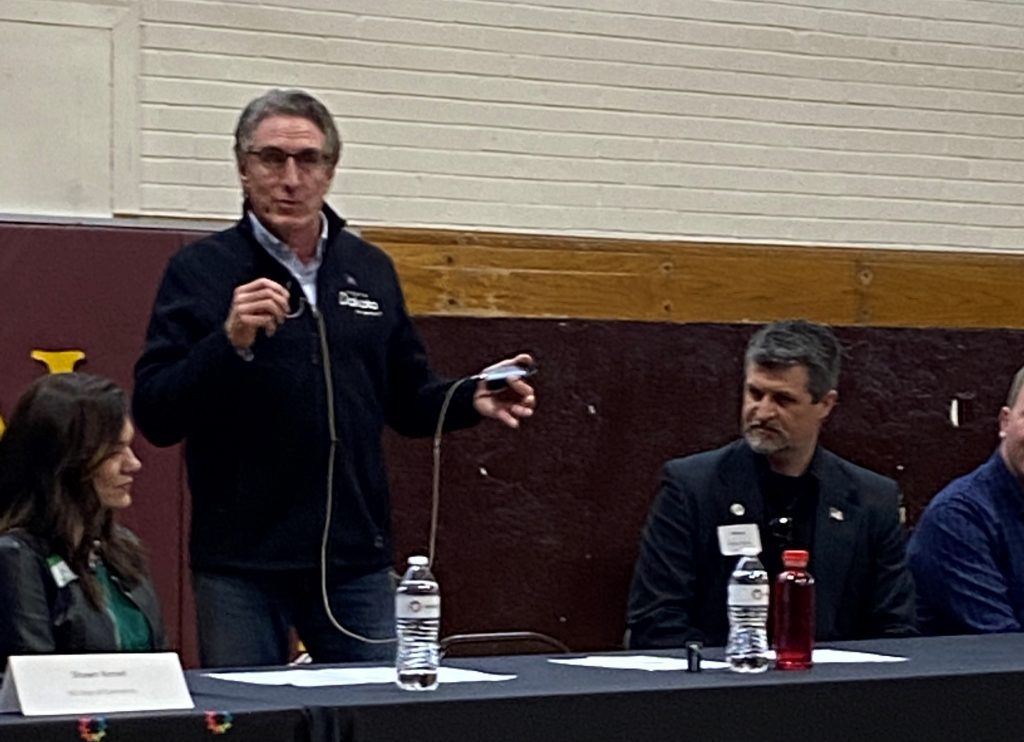

By TRISHA AHMED Associated Press/Report for America
North Dakota Gov. Doug Burgum on Tuesday praised the oil and gas industry for being a "powerhouse" and "game-changer" for the state's economy, and bashed the White House for trying to shift the country away from climate change-causing fossil fuels.
Citing recent studies, the Republican governor said the industry contributed more than $42 billion to the state's economy in 2021, employed nearly 50,000 people and was responsible for more than half of the state's tax revenue.
The oil and gas industry directly employed about 14,200 people and indirectly employed 35,185 others in 2021, the most recent year with available data, according to a study conducted by North Dakota State University researchers.
And 51% of all taxes collected by the state came from oil extraction and production taxes in the last five fiscal years, according to a different study by the Western Dakota Energy Association and the North Dakota Petroleum Foundation.
Fossil fuels – coal, oil and gas – are by far the largest contributors to global climate change, according to the United Nations, and have resulted in more extreme wildfires, storms, hurricanes, droughts and floods in recent years — signaling what the UN called a "code red for humanity " that could cause trillions of dollars in damages.
President Joe Biden has made fighting climate change a top priority and backed a landmark law to accelerate expansion of clean energy such as wind and solar power, and to move the U.S. away from oil, coal and gas.
During Tuesday's news conference, Burgum said every citizen in North Dakota has been affected by the oil and gas industry, even if they feel removed from it.
"If you've got a kid that goes to K-12 school," or a family member who drives on the state's highways, or a faucet that delivers clean water, then know that "all of that's been driven by the success and the productivity that we've seen from this industry," he said.
Ron Ness, president of the North Dakota Petroleum Council, spoke alongside Burgum and said some of the biggest impediments to the state's oil and gas production have been the federal regulatory climate and the Biden administration's messaging to the public about the end of oil and gas.
Finding and retaining workers has also been challenging during the state's wide-ranging workforce shortage, and so has attracting capital investments. "We still aren't where we need to be with Wall Street and the investment firms on wanting to invest money into oil and gas," Ness said.
Burgum added that North Dakota should reduce its income tax, so it can compete with other oil-producing states — like Wyoming, Texas and Alaska — that have zero income tax. Investing in workforce training and expanding access to affordable childcare would also help to attract workers, he said.
"The state's never been in better financial shape, and a big thank you to the oil and gas industry for that. But once again, we find under this administration that there's a lot of headwinds," Burgum said. "Rather than trying to sell clean U.S. energy to our friends and allies, we have an administration that instead would prefer that our allies around the world buy it from our enemies."
Meanwhile, the Biden administration is weighing approval of a major oil project in Alaska that supporters say represents an economic lifeline for Indigenous communities in the region but environmentalists say is counter to Biden's climate goals.
Citing the dangers of climate change, Biden canceled the controversial Keystone XL oil pipeline in his first days in office and suspended new oil and gas leases on federal lands. The moratorium has since been lifted, under court order, but Republican lawmakers have complained that lease sales for new drilling rights are still limited.